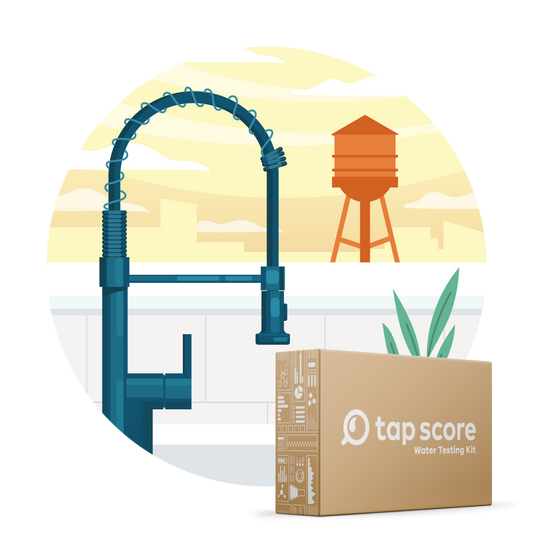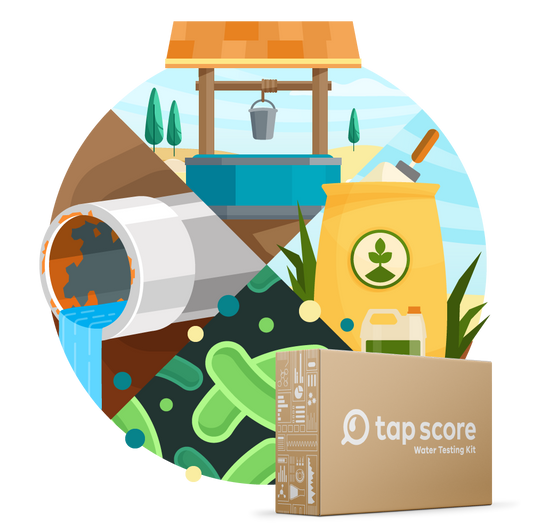
How Do I Know If My Water Filter Is Working?
Our blog is written by real experts— not AI. Each guide is carefully reviewed and updated based on the latest research. Plus, with no affiliate links, you can count on unbiased insights you can trust.
On your water’s journey from its source to your home, it may be exposed to any number of contaminants. Residential water filtration products will claim to remove different parameters from your water, but how do you know they’re working?
While a sudden change in the taste, odor, or color of your water can indicate that your filter is failing, high levels of important contaminants, such as pathogens, arsenic, lead, and nitrates, are not observable to your senses.
The only way to truly know whether or not your filter is working is to test your water.
How Can I Test My Water Filter at Home?
The most effective way to determine if your water filter is working properly is to test your water before and after it passes through your filter.
Such analysis is called performance testing because it tests the effectiveness of your filter in reducing or removing potentially harmful contaminants that pass through. This article explains how to test your water filter and how to use water filter performance testing to optimize your home (and body’s) most precious resource.
Performance Testing Your Water Filter
There are two main ways to measure your filtered water quality:
Conduct a Full Performance Test
- This method requires you to order two tests, one test of the water before filtration and one test of the water after filtration.
- A full performance test evaluates the effectiveness of your filter by comparing the contaminant levels before and after filtration. Usually, you hope to see significant reductions of key parameters without any new contaminants emerging in the treated water.
- This is the best way to assess how well your water filter is working.
Conduct a Post-Treatment Test
- A post-treatment test analyzes your water only after it travels through your filter.
- This method evaluates the quality of your filtered water–determining whether the water is safe to drink after filtration.
- You will see the concentrations of the contaminants in the water you’re drinking, but you won’t see the concentration values pre-filtration.
- This option only requires one water test and is, therefore, less expensive.
The Full Performance Test is the only way to evaluate the filter whereas the Post-Treatment Test will not tell you about the effectiveness of the filter, but whether or not your water is safe to drink. When conducting either test, it is important to send your water samples to an accredited water testing laboratory and to pick a water testing package that makes sense for you. Contact us if you want help picking the best water test for your needs:
Steps to Performance Testing Your Water Filter
1. Ordering Your Testing Kit
Once you have decided which test you would like to conduct, you are ready to order your testing kit(s).
-
If you get your water from the city/public utility, consider using either the Essential City Water Test, Advanced City Water Test, or Extended City Water Test.
-
If you get your water from a private well, consider using either the Essential Well Water Test, or Advanced Well Water Test.
Each test measures an array of different contaminants, so you should choose which test will best evaluate your filter’s effectiveness based on the contaminants that it claims to remove.
2. Preparing to Test
If you choose to conduct either a Full Performance or Post-Treatment Test, we advise running the test about 2 weeks after installing a fresh filter and/or cleaning your system. How long to wait after installing the new filter can depend on the specific product you've installed or cleaning process you've performed, but generally a period of about 2 weeks will allow your updated system time to settle in.
3. Testing Your Water Filter
To test your water filter, simply follow the instructions detailed in the testing kit that you have ordered. If you are conducting a Full Performance Test, collect one sample of water before it enters your filter and one sample that has passed through your filter. If you are conducting a Post-Treatment Test, collect your water sample after the water has passed through your filter.

Reasons Why Your Filter Isn’t Working After Maintenance
Your water is encountering contaminants AFTER filtration.
- For example, if your water is treated using a point-of-entry unit in your garage and the pipes throughout your house are old and contain lead, then your “treated” water can become recontaminated as it travels through your home’s plumbing.
You are not using the right type of filter to remove the desired contaminants.
- Not all filters are equal. Different treatment technology is suitable for different types of water quality and different contaminants. See here to learn more about water treatment and filter selection.
Reasons Why Your Filter Isn’t Working Over Time
Your filter (or membrane) is broken, ripped, or torn and has sustained extensive wear and tear.
- If you collected your sample without first replacing your filter beforehand, then it’s possible a break in your membrane or filters could be making it easy for water (especially under pressure) to choose the path of least resistance–the path untreated!
Your water filter is “used up”.
- Over time, contaminants may have collected on the surface area of the filter media until all (or most) of that surface area is covered with pollutants. When this happens, the filter must either be replaced or backwashed in order to continue removing contaminants.
Your filter has bacteria growing in or on it.
- Microbial growth can reduce filter performance by blocking adsorption, creating breakthrough and contaminant conduits or otherwise overwhelming the filter with other burdens.










